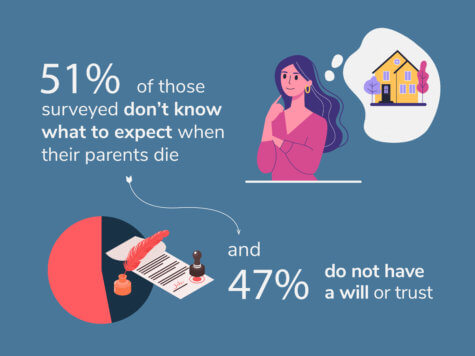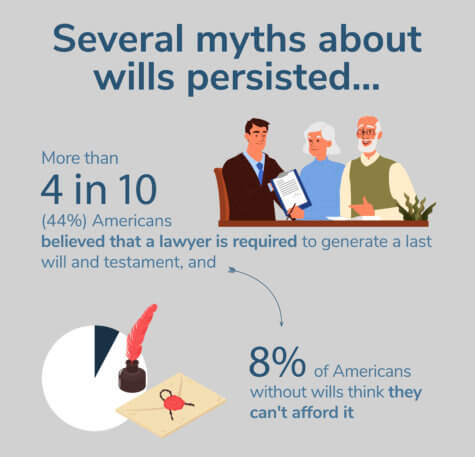NEW YORK — Despite the COVID-19 pandemic leading to a rise in will-making, half of Americans still find it “nearly impossible” to discuss death with their family – a phenomenon particularly true for adults trying to speak to their older parents.
According to a new OnePoll survey of 2,000 Americans, 47 percent of people have gone out of their way to avoid talking about death with their parents. Surprisingly, the COVID-19 pandemic hasn’t necessarily led to more of these conversations.
Four in every ten people have never discussed the possibility of their parents’ death with them before. Despite the threat to public safety COVID brings, only 12 percent of those who had never spoken to their parents about death before 2020 did so for the first time over the last year. The other 88 percent of this group still haven’t had a conversation about their parents’ final wishes.
Commissioned by FreeWill, a free online will maker, the survey finds over one-third (37%) of Americans have only discussed the possibility of their parents’ death with them in passing. Less than a quarter (24%) have discussed it extensively.
This lack of discussion may be due to the fact that many Americans just don’t feel prepared to have that uncomfortable conversation.
Will not: Americans aren’t prepared for death
 More than half of those surveyed (51%) have little to no idea what to expect when their parents die. Another 47 percent do not have a will or trust either. In addition, many report not feeling emotionally ready to deal with the inevitability of their parents’ demise. Nearly a quarter of the poll expect to cope poorly when they eventually lose a parent.
More than half of those surveyed (51%) have little to no idea what to expect when their parents die. Another 47 percent do not have a will or trust either. In addition, many report not feeling emotionally ready to deal with the inevitability of their parents’ demise. Nearly a quarter of the poll expect to cope poorly when they eventually lose a parent.
However, 60 percent of people would be more willing to discuss their parents’ or their own final wishes if they knew how to approach the topic. Removing the stigma around death could go a long way towards easing the conversation.
“So many people are fearful about bringing up end-of-life concerns, but the reality is that the stigma only exists if we allow it to,” explains Jenny Xia Spradling, Co-CEO of FreeWill, in a statement.
“Being open with your loved ones about death should be treated no differently than discussing health concerns or other important issues – which is to say, openly and honestly. In many cases, clarity is kindness.”
Common myths about the end
 Some of the reluctance to discuss estate planning and other end-of-life concerns may also stem from a lack of knowledge about preparing for that sad day.
Some of the reluctance to discuss estate planning and other end-of-life concerns may also stem from a lack of knowledge about preparing for that sad day.
Forty-four percent of Americans believe that a lawyer is required to create a last will and testament. Another eight percent of those who haven’t made a will believe they can’t afford one.
While this could help to explain why close to half (47%) of people have neither a will nor a trust set up, it’s an incorrect assumption. In fact, multiple no-cost avenues for creating a last will and testament do exist and are perfectly legal. Of those Americans that have set up a will or trust, nearly one in five (19%) used software instead of a lawyer to generate it.
Another interesting trend that emerged: Of those that had already set up a will, less than a quarter of them left money to a nonprofit organization. One-third of respondents who haven’t donated to charity in their wills said they simply didn’t know it was an option.
“So many people want to leave a legacy that’s meaningful to them, but think that doing so will require excessive cost or elaborate planning, and that couldn’t be further from the truth,” the FreeWill co-CEO adds. “Free, online estate planning options make it easier than ever to lay a blueprint for your legacy without burdening your loved ones, and make having those tough conversations that much easier.”
